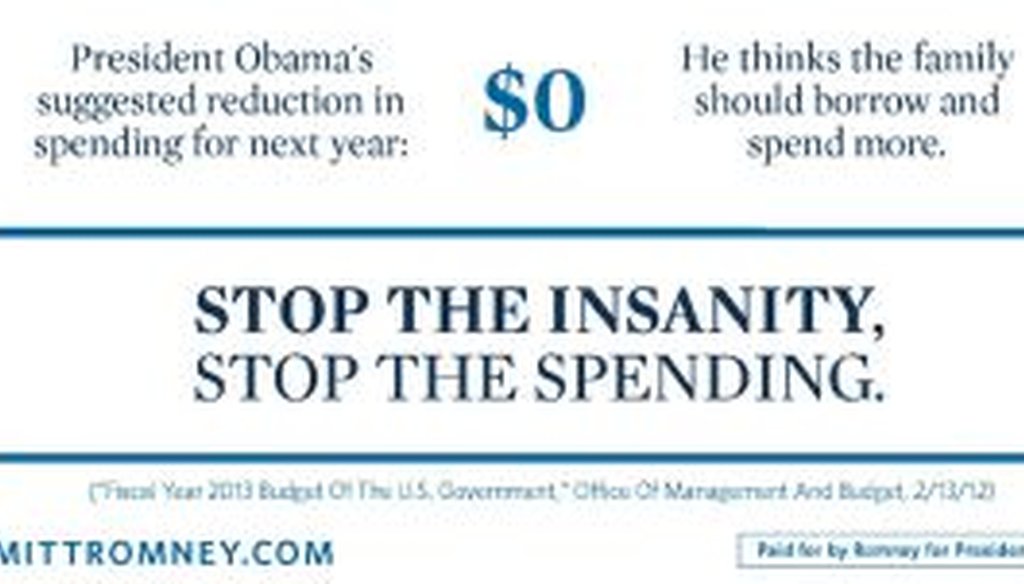

Our only agenda is to publish the truth so you can be an informed participant in democracy.
We need your help.


This is a portion of a graphic produced by Mitt Romney's presidential campaign, which says that President Barack Obama isn't proposing cuts to federal spending.
In an effort to relate the federal budget to a typical family’s budget, the Mitt Romney presidential campaign posted an explanatory graphic on April 17, 2012. It concludes with this claim "President Obama's suggested reduction in spending for next year: $0."
We decided to see whether that’s accurate.
As its source, the graphic pointed to Obama’s budget proposal for fiscal year 2013. This document, produced annually, is usually considered an opening volley rather than a final set of numbers, particularly when the president and Congress are controlled by different parties. Congress typically gives little deference to the president’s budget request.
Still, as a summary of the president’s fiscal priorities, it’s reasonable for Romney to use it in the way it did. The question is whether Obama did propose no net reduction in spending for 2013 compared to 2012.
Indeed, Romney has a point.
According to Obama’s proposal, overall federal outlays would increase from $3.796 trillion in fiscal year 2012 to $3.803 trillion in fiscal 2013. That’s an increase -- though a modest one. It’s a rise of two-tenths of 1 percent of all federal outlays, which is likely to fall well short of the inflation rate.
But an important detail is missing: Obama doesn't have much control over the parts of the budget that are increasing -- the "mandatory spending" and net interest.
Mandatory spending includes entitlements such as Social Security, Medicare and Medicaid. Their annual costs are determined by automatic formulas rather than congressional appropriations. Meanwhile, net interest is what the nation pays on its outstanding debt. Collectively, mandatory spending and net interest account for about 65 percent of federal outlays in 2012.
The remaining 35 percent is considered discretionary spending -- funds that are appropriated by Congress and signed by the president on an annual basis. This part of the budget includes all the other functions of government that aren’t determined by a formula.
Under the president’s budget, mandatory spending plus net interest -- the costs that are largely set by formula and debt commitments -- are poised to rise from $2.477 trillion to $2.541 trillion between 2012 and 2013, an increase of about 2.5 percent. But discretionary spending -- again, the part he has more control over -- would actually decline from $1.319 trillion to $1.261 trillion, a drop of 4.3 percent. So by this measure, Obama is suggesting cuts in his budget proposal.
Our ruling
Romney claims that the president’s "suggested reduction in spending for next year" is zero. Romney's claim ignores the detail that Obama proposed cuts in the discretionary portion of the budget, which he has more control over. The increases come from mandatory spending and net interest. Still, Obama could propose cuts in mandatory spending if he wanted.
The statement is accurate but needs clarification. We rate it Mostly True.
Mitt Romney for President, "What if Your Family Budget Was the Federal Budget?" (Infographic), April 17, 2012
Office of Management and Budget, summary tables for president’s fiscal 2013 budget proposal, accessed April 20, 2012
Bureau of Labor Statistics, Consumer Price Index for All Urban Consumers (CPI-U) historical table, accessed April 20, 2012
Email interview with Stan Collender, partner at Qorvis, April 20, 2012
Email interview with Steve Ellis, vice president of Taxpayers for Common Sense, April 20, 2012
In a world of wild talk and fake news, help us stand up for the facts.
